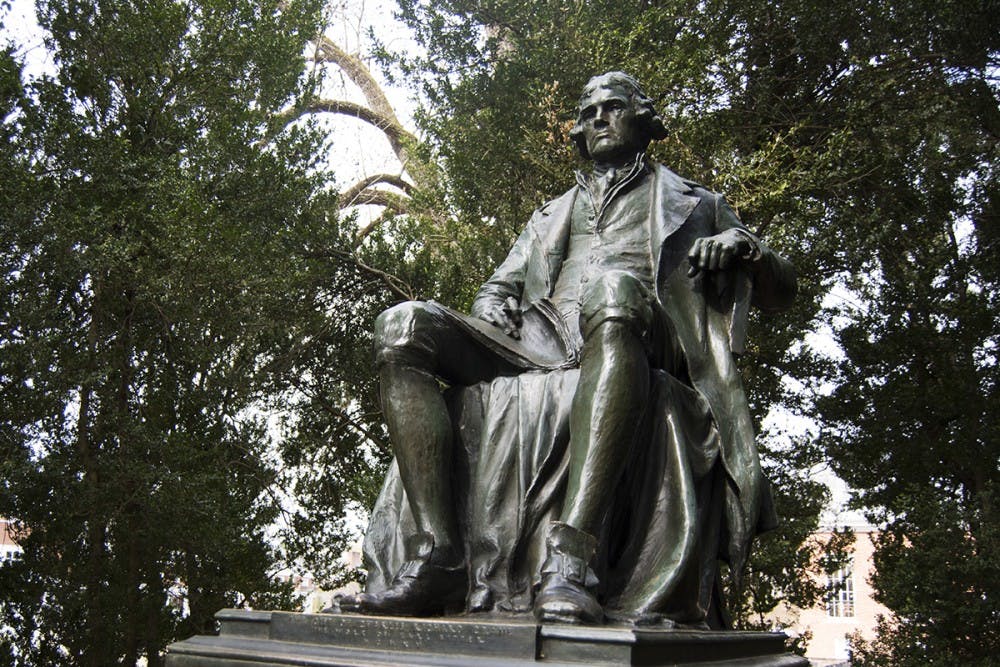As the University celebrates Founder’s Day — Thomas Jefferson’s birthday on April 13 — it is important to keep in mind the complex legacy he left behind. The University has kept its Jeffersonian values — discussion, collaboration and enlightenment — since its inception. Jefferson’s ideals remain relevant today as we move forward into the University’s third century. Adhering to these values will help the University maintain its world-class academic experience, while also continue to address Jefferson’s — and by extension, the University’s — legacy of racism.
Based on these principles, the University has taken strides this year to make progress and encourage communal learning. The strength of these values was tested after the events of Aug. 11 and 12, prompting an increase in community discussions of diversity and problems that continue to plague our society. The Deans Working Group has held a number of roundtable discussions this year that are emblematic of this renewed commitment to open dialogue.
In a prominent example of progress at the University, the Board of Visitors fulfilled several of the Black Student Alliance’s demands made in light of these events. The Board of Visitors voted in September to remove Confederate plaques on the Rotunda and revised the open flame policy, banning it from the Lawn. The University also donated an inflation-adjusted $12,500 to pay for medical expenses of the victims of the Aug. 12 events — observing another one of the BSA’s demands to acknowledge a 1921 $1,000 donation by the Ku Klux Klan.
In addition to the University’s ongoing response, students acted with the values of discussion, collaboration and enlightenment in mind. Student leaders were vocal in denouncing the Unite the Right rally and pushed University administrators to do the same. In the immediate aftermath of the rally, community members organized a candlelit vigil on the Lawn in an attempt to combat the hateful forces that descended upon Charlottesville. Hundreds also walked out together to protest gun violence on March 14 in light of the Stoneman Douglas shooting, demonstrating the collaboration and discussion Jefferson hoped the University community would show.
Another significant step forward is the University’s rebalancing of its historical landscape. Like many other universities in the United States who have begun acknowledging their ties to slavery in recent years, the University is in the process of developing the Memorial to Enslaved Laborers. The University’s recognition of its shortcomings is several years in the making, with students first calling for a memorial in 2010. This year, however, the project has made more headway and is now in its final stages before construction, with the BOV approving the design and beginning to fundraise. The memorial is set to be completed by the spring of 2019 and will feature the names of the enslaved laborers.
Increasing diversity on Grounds is another issue the University has addressed in multiple avenues, from admissions to faculty. Though the low percentage of African-American undergraduates enrolled in the University was criticized in the BSA demands, the University has made efforts to increase this number in recent years. Since 2012, enrollment of first year minority students, first-year African-American students, first generation students and students with Pell Grant eligibility has increased by at least 34 percent in each category. In that same time, overall undergraduate enrollment increased by 9.5 percent. In comparison, enrollment of minority students grew by 22.4 percent. This increase among the student population has been accompanied by programs that highlight diversity around Grounds. Through the Engineering School’s Excellence Through Diversity Distinguished Learning Series, for example, the University is empowering many voices that need to be heard.
While the University should be recognized for its recent efforts to acknowledge minority voices and promoting diversity around Grounds, it should also build on these accomplishments with Jeffersonian goals, as should students. As the events of Aug. 11 and 12 fade into memory, the University community should continue its efforts to build a more welcoming and inclusive space for all. Strides towards progress should not only occur in times of crisis — we must act on the best of Jefferson’s ideals, while working to overcome their faults.
The Cavalier Daily Editorial Board is composed of the executive editor, the editor in chief and three at-large members of the paper. The board can be reached at eb@cavalierdaily.com.








